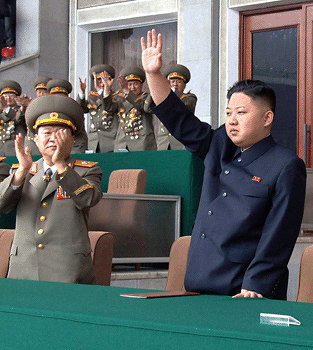North Korean Dictator Elected–Unanimously!
Monday, March 10th, 2014March 10, 2014
North Korea’s supreme leader, Kim Jong-un, was elected yesterday to the nation’s highest legislative body, the Supreme People’s Assembly. He received 100 percent of the votes in his district, where 100 percent of registered voters turned out for the polling. Uniformed soldiers danced together joyfully following the balloting.
The Assembly consists of 687 deputies. Yesterday’s election was the first since Kim inherited power after the death of his father, Kim Jong-il, in 2011. The state-run Korean Central News Agency described Kim Jong-un’s election as “an expression of all the service personnel and people’s absolute support and profound trust in supreme leader Kim Jong-un as they single-mindedly remain loyal to him.”
Political experts on the situation in North Korea suggested that yesterday’s elections were intended to further consolidate Kim Jong-un’s power; all of the candidates were hand-picked by him; thus, older deputies were replaced with younger officials, whose loyalty to Kim is absolute.
Since assuming power, Kim has engineered a number of political purges to eliminate potential challenges to his rule. In the most dramatic of these, Kim’s uncle–Jang Song-thaek, once the second-most powerful man in the country–was charged with corruption, found guilty, and summarily executed. Experts on North Korea believe that the older deputies rooted out in yesterday’s election included people whom Kim feared may have harbored lingering loyalties to Jang.

Kim Jong-un holds power as ruthlessly as his father and grandfather. (© EPA/KCNA/Alamy Images)
Kim holds many titles, including supreme commander of the armed forces. His grandfather–Kim Il-sung, who ruled North Korea from 1948 until his death in 1994–established an absolute dictatorship, exercising total control over all aspects of society. North Korea remains a totalitarian state, where much of the population lives in profound isolation and dire poverty. A series of natural disasters coupled with an indifferent government resulted in the starvation of an estimated 1 million North Koreans from 1995 through 2000.
Adequate nutrition remains a problem. Since the widespread famine of the 1990′s, mismanagement, bad weather, and inadequate investment in agriculture have hampered recovery efforts. European Union nutrition experts have reported that state-issued food rations, on which two-thirds of North Korea’s population depend, comprise only one-fifth of standard daily nutritional requirements.
Additional World Book articles:
- North Korea 1995 (a Back in Time article)
- North Korea 1996 (a Back in Time article)
- North Korea 1997 (a Back in Time article)
- North Korea 1998 (a Back in Time article)
- North Korea 2000 (a Back in Time article)
- North Korea 2011 (a Back in Time article)


